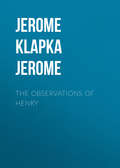
Джером К. Джером
Passing of the Third Floor Back
“I am not a boy,” explained the stranger; “and I had no intention of being bold.”
“I know,” replied Miss Kite. “It was a silly remark. Whatever induced me to make it, I can’t think. Getting foolish in my old age, I suppose.”
The stranger laughed. “Surely you are not old.”
“I’m thirty-nine,” snapped out Miss Kite. “You don’t call it young?”
“I think it a beautiful age,” insisted the stranger; “young enough not to have lost the joy of youth, old enough to have learnt sympathy.”
“Oh, I daresay,” returned Miss Kite, “any age you’d think beautiful. I’m going to bed.” Miss Kite rose. The paper fan had somehow got itself broken. She threw the fragments into the fire.
“It is early yet,” pleaded the stranger, “I was looking forward to a talk with you.”
“Well, you’ll be able to look forward to it,” retorted Miss Kite. “Good-night.”
The truth was, Miss Kite was impatient to have a look at herself in the glass, in her own room with the door shut. The vision of that other Miss Kite – the clean-looking lady of the pale face and the brown hair had been so vivid, Miss Kite wondered whether temporary forgetfulness might not have fallen upon her while dressing for dinner that evening.
The stranger, left to his own devices, strolled towards the loo table, seeking something to read.
“You seem to have frightened away Miss Kite,” remarked the lady who was cousin to a baronet.
“It seems so,” admitted the stranger.
“My cousin, Sir William Bosster,” observed the crocheting lady, “who married old Lord Egham’s niece – you never met the Eghams?”
“Hitherto,” replied the stranger, “I have not had that pleasure.”
“A charming family. Cannot understand – my cousin Sir William, I mean, cannot understand my remaining here. ‘My dear Emily’ – he says the same thing every time he sees me: ‘My dear Emily, how can you exist among the sort of people one meets with in a boarding-house.’ But they amuse me.”
A sense of humour, agreed the stranger, was always of advantage.
“Our family on my mother’s side,” continued Sir William’s cousin in her placid monotone, “was connected with the Tatton-Joneses, who when King George the Fourth – ” Sir William’s cousin, needing another reel of cotton, glanced up, and met the stranger’s gaze.
“I’m sure I don’t know why I’m telling you all this,” said Sir William’s cousin in an irritable tone. “It can’t possibly interest you.”
“Everything connected with you interests me,” gravely the stranger assured her.
“It is very kind of you to say so,” sighed Sir William’s cousin, but without conviction; “I am afraid sometimes I bore people.”
The polite stranger refrained from contradiction.
“You see,” continued the poor lady, “I really am of good family.”
“Dear lady,” said the stranger, “your gentle face, your gentle voice, your gentle bearing, all proclaim it.”
She looked without flinching into the stranger’s eyes, and gradually a smile banished the reigning dulness of her features.
“How foolish of me.” She spoke rather to herself than to the stranger. “Why, of course, people – people whose opinion is worth troubling about – judge of you by what you are, not by what you go about saying you are.”
The stranger remained silent.
“I am the widow of a provincial doctor, with an income of just two hundred and thirty pounds per annum,” she argued. “The sensible thing for me to do is to make the best of it, and to worry myself about these high and mighty relations of mine as little as they have ever worried themselves about me.”
The stranger appeared unable to think of anything worth saying.
“I have other connections,” remembered Sir William’s cousin; “those of my poor husband, to whom instead of being the ‘poor relation’ I could be the fairy god-mama. They are my people – or would be,” added Sir William’s cousin tartly, “if I wasn’t a vulgar snob.”
She flushed the instant she had said the words and, rising, commenced preparations for a hurried departure.
“Now it seems I am driving you away,” sighed the stranger.
“Having been called a ‘vulgar snob,’” retorted the lady with some heat, “I think it about time I went.”
“The words were your own,” the stranger reminded her.
“Whatever I may have thought,” remarked the indignant dame, “no lady – least of all in the presence of a total stranger – would have called herself – ” The poor dame paused, bewildered. “There is something very curious the matter with me this evening, that I cannot understand,” she explained, “I seem quite unable to avoid insulting myself.”
Still surrounded by bewilderment, she wished the stranger good-night, hoping that when next they met she would be more herself. The stranger, hoping so also, opened the door and closed it again behind her.
“Tell me,” laughed Miss Devine, who by sheer force of talent was contriving to wring harmony from the reluctant piano, “how did you manage to do it? I should like to know.”
“How did I do what?” inquired the stranger.
“Contrive to get rid so quickly of those two old frumps?”
“How well you play!” observed the stranger. “I knew you had genius for music the moment I saw you.”
“How could you tell?”
“It is written so clearly in your face.”
The girl laughed, well pleased. “You seem to have lost no time in studying my face.”
“It is a beautiful and interesting face,” observed the stranger.
She swung round sharply on the stool and their eyes met.
“You can read faces?”
“Yes.”
“Tell me, what else do you read in mine?”
“Frankness, courage – ”
“Ah, yes, all the virtues. Perhaps. We will take them for granted.” It was odd how serious the girl had suddenly become. “Tell me the reverse side.”
“I see no reverse side,” replied the stranger. “I see but a fair girl, bursting into noble womanhood.”
“And nothing else? You read no trace of greed, of vanity, of sordidness, of – ” An angry laugh escaped her lips. “And you are a reader of faces!”
“A reader of faces.” The stranger smiled. “Do you know what is written upon yours at this very moment? A love of truth that is almost fierce, scorn of lies, scorn of hypocrisy, the desire for all things pure, contempt of all things that are contemptible – especially of such things as are contemptible in woman. Tell me, do I not read aright?”
I wonder, thought the girl, is that why those two others both hurried from the room? Does everyone feel ashamed of the littleness that is in them when looked at by those clear, believing eyes of yours?
The idea occurred to her: “Papa seemed to have a good deal to say to you during dinner. Tell me, what were you talking about?”
“The military looking gentleman upon my left? We talked about your mother principally.”
“I am sorry,” returned the girl, wishful now she had not asked the question. “I was hoping he might have chosen another topic for the first evening!”
“He did try one or two,” admitted the stranger; “but I have been about the world so little, I was glad when he talked to me about himself. I feel we shall be friends. He spoke so nicely, too, about Mrs. Devine.”
“Indeed,” commented the girl.
“He told me he had been married for twenty years and had never regretted it but once!”
Her black eyes flashed upon him, but meeting his, the suspicion died from them. She turned aside to hide her smile.
“So he regretted it – once.”
“Only once,” explained the stranger, “in a passing irritable mood. It was so frank of him to admit it. He told me – I think he has taken a liking to me. Indeed he hinted as much. He said he did not often get an opportunity of talking to a man like myself – he told me that he and your mother, when they travel together, are always mistaken for a honeymoon couple. Some of the experiences he related to me were really quite amusing.” The stranger laughed at recollection of them – “that even here, in this place, they are generally referred to as ‘Darby and Joan.’”






